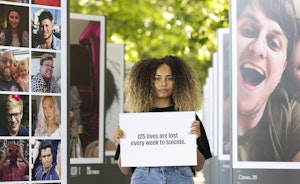The Campaign Against Living Miserably (CALM) is a suicide prevention charity. Every year, about 6,000 take their own life. That’s almost 17 suicides every day, but just four per cent of the British population are familiar with that statistic, while a whopping 71 per cent of people admit that they would not know what to do if somebody was feeling suicidal.
CALM asked its agencies to create a UK-wide campaign that would raise awareness and increase conversations around suicide and suicide prevention. Part of the problem is that the image of suicide is one-dimensional. Google the term and images of people looking sad, or with their head in their hands and crying, come up.
But that isn’t the experience of families bereaved by suicide. They will recall the final days of their loved ones that often do not match the stereotypical caricature portrayed by the media. The reality is that anyone can feel suicidal and that everybody has a role to play.
To demonstrate this in an impactful way, an exhibition comprising photographs of 50 smiling faces was installed on the South Bank on 20 June 2022. To all intents and purposes, these were happy and content people enjoying life. There was no mention of CALM on any image. However, behind-the-scenes conversations about the exhibition were taking place with the media and influencers, teeing them up for its significance.
And on launch day, it was revealed – live on This Morning – that each poster was the last photo of somebody who later took their own life. Simultaneously, a campaign landing page went live along with QR codes on each image, which allowed viewers to delve more deeply into the stories of those people featured. Tools to prevent suicide were also made available, such as a guide to signs to look out for.
This Morning also followed on from the ‘big reveal’ with a discussion about the exhibition and the themes it explored, along with a live phone-in that provided practical support and advice about suicide prevention.
Once the meaning behind the exhibition was revealed, Hope&Glory went live with its media campaign. It worked with families of those featured to convey the message behind the campaign through editorial.

On the day of launch, the campaign featured on every BBC TV and ITV news bulletin. It also aired across Virgin Radio and Times Radio. In total, there were more than 310 broadcast pieces. The story also appeared online and in print in every major UK national newspaper, as well as generating a further 360 items of regional coverage.
Although this was an editorial campaign, it also delivered more than 4.5 million organic impressions and almost 141,000 organic engagements across CALM’s social media channels. This was boosted through earned media – predominantly influencer posts about the exhibition – which delivered almost six million further impressions, roughly 960 per cent higher than CALM’s six-month average.
All told, there were more than 800 items of coverage, all of which were positive. Almost every piece of coverage – 85 per cent – carried one of four key suicide prevention messages. Start a conversation. Talking helps. Ask twice. It can be hard to spot the signs.
The impact did not stop there. CALM experienced a 40 per cent open rate for its newsletter, against a 17 per cent six-month average, and a five-fold increase in sign-ups year-on-year. More than eight in ten visits to the website were new users, and the time spent on the site increased by 37 per cent (or almost one minute). The charity also gained 17,801 new social followers through the campaign and, while it wasn’t a critical measure of success, donations increased by 400 per cent year on year.
The judges described the campaign as powerful and phenomenal. ‘It was beautifully and sensitively activated which had real impact,’ they said. ‘And, as with all brilliant campaigns, it could be reactivated and used again in the future.’



